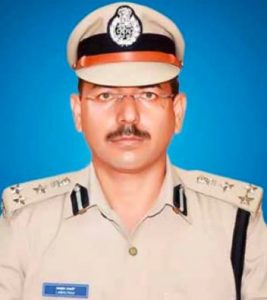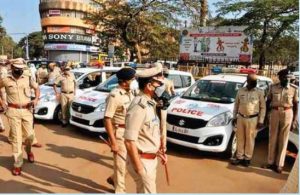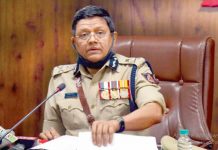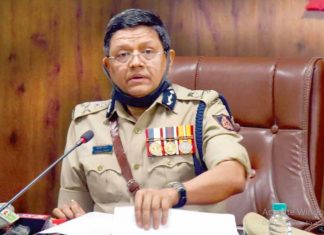
The police domain experience of crowd control, public order management, investigation of criminal acts, deterrence of the law-breaking behaviours and intelligence collection of anti-social activities was utilized to its capacity during the COVID 19 pandemic.
The act of not obeying quarantine requirements, defying home stay or hospital stay rules and concealing the contact history of those who catch the infection, have invoked essentially public health measures which require actions related to the domain of police expertise.
Enforcing a rule compliant behaviour and contact tracing of infected people are skill sets in which police is an expert. As the lockdowns progressed, the role of the police in the pandemic extended to another huge area of state responsibility and that is, assistance of the crisis stricken vulnerable, the poor and the helpless who required urgent help in transportation to hospitals, supply of essential commodities, food and relief resources. This even involved in some cases, ferrying of dead bodies and facilitating the last rites, if no one was available to claim the dead body.
The police stood at the centre stage of this health-related crisis, placing the police staff next only to the health workers as important agents to render services for mitigating crisis amidst high levels of expectation from them in the wake of widespread fear and insecurity in the society.
The police had four major interfaces in the management of the pandemic, namely; enforcing the lockdown through movement restriction, assistance to the vulnerable during the crisis, contact tracing through the use of investigation & intelligence skill.
In a brief interaction Labhu Ram, Police Commissioner- Hubbali & Dharwad discusses the various facets of challenges in policing due to the pandemic COVID19 with Jyoti Pathak, Executive Editor- Karnataka Protector.
Your initiative – Library for aspirants of competitive examination is unique. How did the idea originate?
We realized that children of policemen of all ranks were keen to join the government services through competitive examinations. But often due to lack of resources were deprived and lagged behind. And, so we came up with the idea of setting up a library. The idea was appreciated and library was set up. We feel satisfied that youngsters got the necessary support and they are making the most of it. After a period of time, we plan to set up more such libraries.
Every Commissionerate has certain crime challenges that are typical to the area. What are those in your area and how are they being tackled?
Hubbali – Dharwad Commissionerate is a fairly peaceful zone with petty crimes dominating the zone. House burglary is quite common crime here. We are vigilant and take efforts to maintain peace and order in the zone.
How did COVID19 impact the policing strategies in your zone?
 Day to day policing was almost nil due to lockdown. The focus during COVID19 was largely on implementation of covid appropriate behaviour. Police provided a great support to the medical staff. The less visible, aspect of the Covid-19 lockdown was the social service function of the police. Throughout India, local police agencies were assigned the task of enforcing social distancing. The lockdown due to COVID 19 brought officers into regular contact with the citizens who needed urgent assistance. Police officers were at the forefront of India’s public health campaign, providing information and essential supplies.
Day to day policing was almost nil due to lockdown. The focus during COVID19 was largely on implementation of covid appropriate behaviour. Police provided a great support to the medical staff. The less visible, aspect of the Covid-19 lockdown was the social service function of the police. Throughout India, local police agencies were assigned the task of enforcing social distancing. The lockdown due to COVID 19 brought officers into regular contact with the citizens who needed urgent assistance. Police officers were at the forefront of India’s public health campaign, providing information and essential supplies.
Police played a crucial role in dealing with COVID 19 pandemic. Could you elaborate on some of the outstanding contribution of police?
Every check post was monitored. Police department supported the hospital staff involved in COVID 19 duty. They delivered food to the hospital staff. Enforcing COVID 19 guideline and COVID 19 appropriate behaviour was important.
The role of police has been lauded in dealing with COVID19 pandemic. What were some of the initiatives to boost the morale of the police?
There is beyond doubt that police force contributed significantly during the pandemic. They were at job risking their lives throughout the day. The risk was tremendous, first of contracting coronavirus themselves, transmitting to family members. The resources available for the Indian police agencies were miniscule. Despite these handicaps, they rose to the challenge of enforcing the lockdown and promoting public health. The entire force was on COVID duty starting from the rank of constable to higher ranks. They were vaccinated. The infected policemen were sent to hospital. We ensured that they were given best treatment. To boost the morale of the ailing policemen we used to videoconference with them. A team of officers used to be in touch with the doctors. We ensured that they got the best treatment possible and family felt secure.
Healthy cop community relationship is crucial to meet the challenges of policing. What have been the initiatives of Hubbali- Dharwad police?
According to the new beat system devised by DGP office every constable is assigned an area. They meet the residents of the area, understand their problems. The interaction of police with area residents makes them feel secure. They provide feedback to the residents. Sometimes senior officials also visit the residents. So, a close interaction makes it easy for functioning.
How satisfying has been your career? What are some of the assignments of your career that were very challenging?
Every day is a challenge in policing. But I am satisfied that I am able to deliver to the best of my ability. The most challenging and satisfying assignment was my posting at Bengaluru. Policing is one of the best services. It is very satisfying to be in a position to help somebody.













